The Group 4: Art is Dead
By Melline Galani and Chloe Chan
Melline writes: I was invited by my close friend Chloe Chan to a different sort of musical On a cold December night, performance at the Bohemian. I was not sure what to expect, but by knowing Chloe, I was certain that the event would raise my interest, and so it did.
It was the first time for me to experience a “manifest” performance, which combined sounds and visuals in such a manner that touched on all the problems of modern society, not only in Korea but worldwide, with a deeper focus on hot issues of the moment and Gwangju’s modern history.
The performance was accompanied by images rolled on a big screen behind the stage, guided by modern dance performed by a very talented individual. Though the music had no lyrics, the impact and the emotions transmitted were more than words could have expressed. The entire show began with a short movie representing a young man starting to walk in his bare feet from the former Jeonnam Provincial Hall to the venue. When he entered the door, the music started to be accompanied by the visuals.
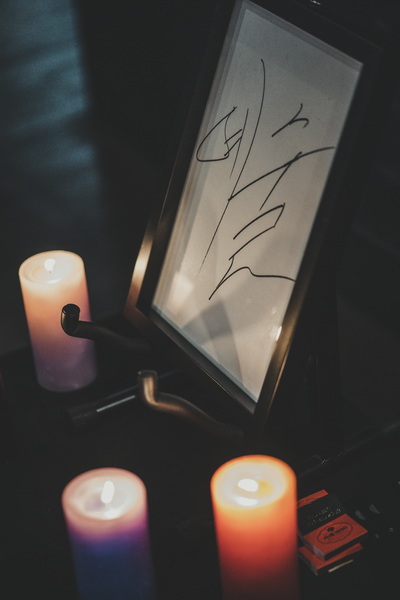
Art in all its forms is also a means of education while addressing the social issues our society faces today.
Chloe writes: Loose T-shirts, metal necklaces, and fine tattoos – these music performers looked every inch the classic underground artists you can see on the Korean variety show Show Me the Money. But as someone who has known Sagoon for over three years, I know very well that he has always been a gentle and loving person despite how “badass”-looking he is. In fact, after receiving a phone call from him asking me whether I could assist with his art project, I immediately said yes.
The part I was honorarily involved in was about democratic movements. Even as a Hongkonger, I am always able to sympathize with Gwangju citizens in their passion for fighting for human rights, but this performance hit me quite differently. Drumbeats, intense rhythms, strong visual effects on the back screen, and vocals reproduced electronically – these elements cocreated a unique, mind-blowing experience that really made me emotional. The impassioned speech I delivered as a closure to one of the tracks was indeed a declaration of Hong Kong protesters. I am not entitled to comment on my own performance, but I highly appreciate the genius in The Group 4 for coming up with this brilliant idea. I believe the entire show was a powerful shout-out to the crowd that it is time for us to face up to the longterm problems of today’s society.

In order to know more about the project, we interviewed the founding members of the project, bassist Choi Jeongsik (최정식) and drummer Sagoon (사군).
Melline Galani & Chloe Chan (MG&CC): Please introduce yourself to our readers.
Sagoon & Choi Jeong-sik: Hello, we are The Group 4. Our band was inspired by The 4th Group’s art funeral in the 1970s led by Mr. Kim Gu-rim, and it was created by the two of us, bassist Choi Jeong-sik (최정식) and drummer Sagoon (사군), in accordance with the idea that art should be integrated within society as a whole.
MG&CC : Can you tell us how and when your passion for music started?
Sagoon: We first met five years ago at a street performance commemorating the Sewol ferry disaster and the impeachment of President Park Geun-hye. Two years later, Jeong-sik and I joined forces to create the band.
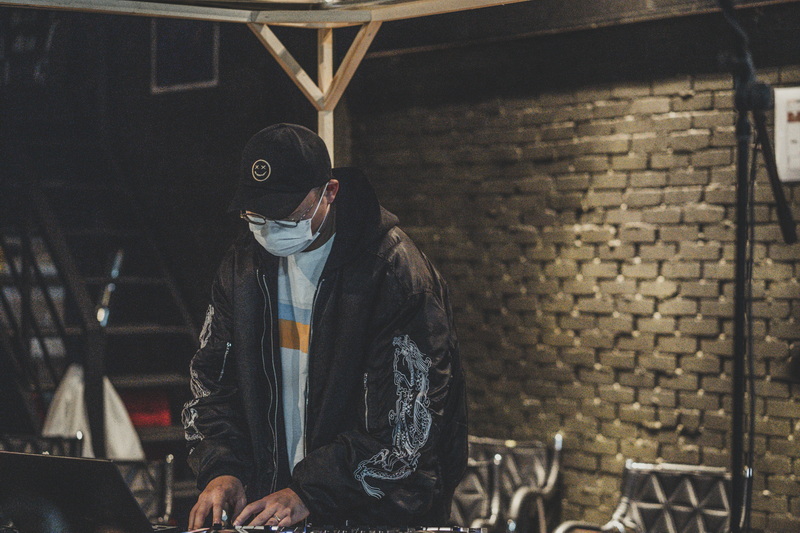
MG&CC : Are there any specific genres that you find yourself connected to or that you are attracted to when you listen to music?
Choi Jeong-sik: I do not prefer any particular genre, but I listen to my favorite songs in different situations and
moments.
Sagoon: Rather than a specific genre, I like various music by diverse artists and other art forms that include books, movies, photographs, or artworks. To name a few musicians whom I have been greatly influenced by, they include Led Zeppelin, Pink Floyd, and the Red Hot Chili Peppers.
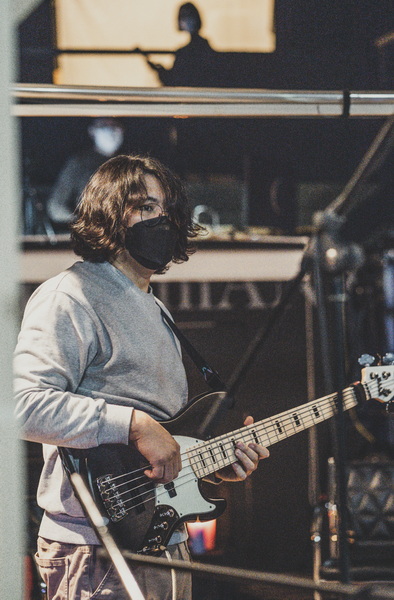
MG&CC: What defines your music?
Sagoon: This may sound overly lofty, but it is human life than influences our music. We wanted to capture the numerous stories and problems that we were experiencing around us and the scenes of daily life that we sometimes pass by and ignore. I hope that our group will become a genre in itself rather than being characterized as part of a
specific genre.
MG&CC: Please tell us the concept behind the show you had on December 3 at the Bohemian.
Sagoon: The performance at the Bohemian was themed “Art Is Dead” and was inspired by the aforementioned art funeral of The 4th Group in 1970,* which criticized all the art forms of society influenced by capitalism.
The first song unveiled the numerous problems in Korean society, so I thought that the passage of time and the story of modern and contemporary history were essential. The second song, “Factory Mass Production,” contains a critique of capitalism that views and judges people and the world based on their production value. The third song was inspired by the movie No. 3 (넘버 3) and satirizes modern society beset by power and capital. The main character of the movie is the number-three man in a gang who wants to become number one.
The fourth song, “Phone,” contains the lyrics “Aren’t we like people who sit in a red-light district waiting to be sold?” I came up with this idea while I was at a daily laborers’ center. It is about people who are being sold for different purposes, those behind them, and the human rights betrayed by capitalism. (Note: Sagoon also told us that he was inspired by the recent scandal that shocked society involving porn-like movies filmed with phone cameras and uploaded in private chat rooms.)
The fifth song, “Democratization,” is an unfinished story about Gwangju, Hong Kong, and Myanmar. The sixth song is about this crazy society and a world where common sense does not work. The last song, “Earth,” expresses the sorrow of the earth towards the humans who have brutally destroyed and failed to protect this planet.
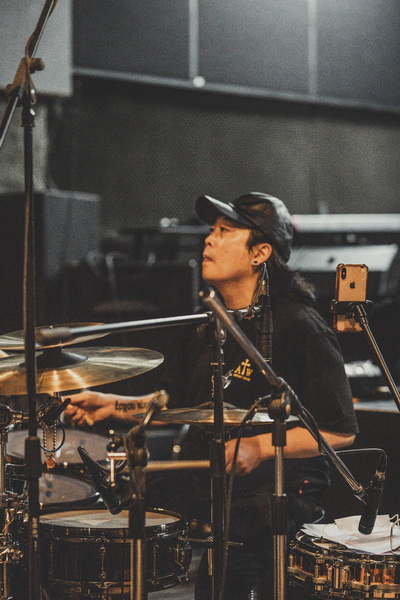
MG&CC: When did you start doing such meaningful music, conveying messages such as human rights?
Choi Jeong-sik: It was when I came across folk songs while entering college and learned that the world I knew was not the way I had thought. I hope that heartbreaking events such as the May 18 Democratization Movement, the martyrdom of Ryu Jae-eul, the Yangju highway incident (involving Shin Hyo-sun and Shim Mi-seon), the Yongsan fire disaster, the martyrdom of Park Jongtae, the Sewol ferry disaster, and other such events will not happen again.
Sagoon: It took us five years to put our ideas into practice. The reason for making this kind of music seemed to be when the words “love God” and “love your neighbor” began to burn in my heart. As you all know, Korean society is very dynamic, so I thought that something or some event could happen to me, so I started to sympathize with others.
MG&CC : How do you present political and economic issues to the young generation? Do you think your music can make a change?
Sagoon: I do not know how our music will impact the younger generation. However, I think there will be a new generation of artists who will continue to talk about these things.
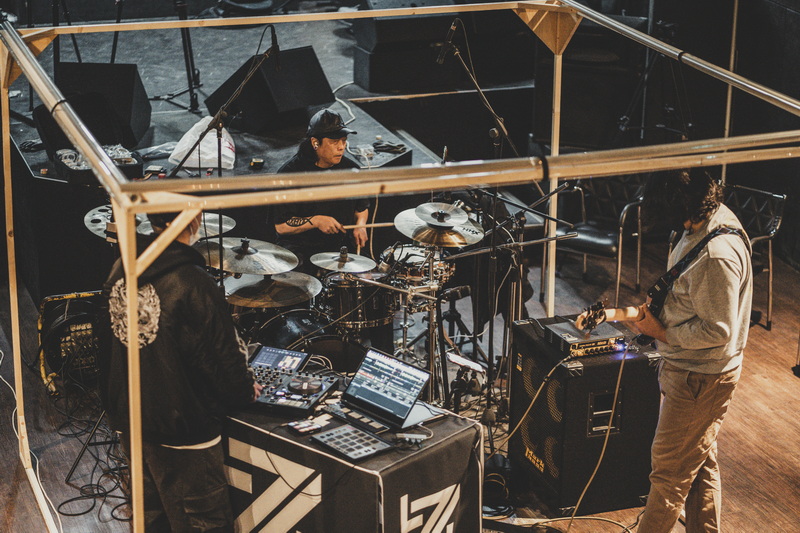
MG&CC : Performing live seems very important to you. How have you been dealing with the constraints of the
pandemic?
Sagoon: For us, COVID-19 is not so important. The stories and the videos we are making are our priority. Honestly, I thought about proceeding without an audience for the performance in December. We do use a lot the modern channels of social media such as YouTube and Instagram. For the visual part of the performance, I had a lot of meetings and talks with movie director Baek Jongrok (백종록). Featured DJ Syunman (션만) helped mix and master not only the performance but also the understanding of the entire song, the poster production, the intro music, and a mixtape of a human rights activist’s voice. The dance expressed by Jeong Chi-hyeon’s (정치현) body movements ignited both the nature of the song and passion for the work, and Lee Jung-woo (이정우) installed the lighting for the Xyloband and special devices the day before the performance to help us all perform smoothly. Lee Yong-hak (이용학), CEO of Haks Studio, took great pictures and videos. Choi Minseok (최민석) silently but effectively played his role as the floor director. Also, I would like to thank Kim Nam-kook (김남국), CEO of Gwangju Bohemian Club. Once again, I
would like to express my deep gratitude to everyone.
You can watch our video on YouTube by typing in the following: 제4집단_thegroup4official
MG&CC: What are your future plans for the band?
Sagoon: We want music to become a work of art rather than a mere performance. Furthermore, we would like to try to combine it with media art and the metaverse. Our plan of action is to present our work when everything is ready at the time and place we want without rushing. We are preparing for our next concert in Jeonju in January 2022.
THE GROUP 4
Instagram: @thegroup4_official
Facebook: https://www.facebook.com/TheGroup4official
• Drummer: Sagoon @sagoon27
• Bassist: Choi Jeong-sik @coe4171
• Film Director: Baek Jong-rok
• Featured DJ: Syunman @syunman
• Dance Performer: Jeong Chi-hyeon @politics_hyeon
• Recording (Digital Creator): Lee Yong-hak @haks_studio
• Lighting: Lee Jung-woo @jj___0.0
• Floor Director: Choi Min-seok @chergei_530
• Vocals: Chloe Chan @hoi0305
Photographs courtesy of Haks Studio @haks_studio.
The Interviewers
Melline Galani is a Romanian enthusiast, born and raised in the capital city of Bucharest, and is currently living in Gwangju. She likes new challenges, learning interesting things, and is incurably optimistic. She loves living life as itis while discovering new places and meeting interesting individuals. Instagram @melligalanis
Originally from Hong Kong, Chloe Chan has just completed her master’s degree in NGOs at Chonnam National University. She is currently serving several NGOs and MPOs as a full-time freelancer and volunteer. Instagram @hoi0305
Footnote
* The 4th Group was a performance art group founded in 1970. It was a rare example of an attempt at avant-garde art in Korea. The members of The 4th Group were embroiled in controversy even before the group’s founding. On Liberation Day in 1970, The 4th Group held a “Funeral for Established Culture and Art and the Existing System” as their second performance after their founding. When the funeral procession reached Gwanghwa-mun in Seoul, they were stopped by the police for questioning. (Source: https://m.khan.co.kr/feature_story/ article/201309272006415#c2b)







